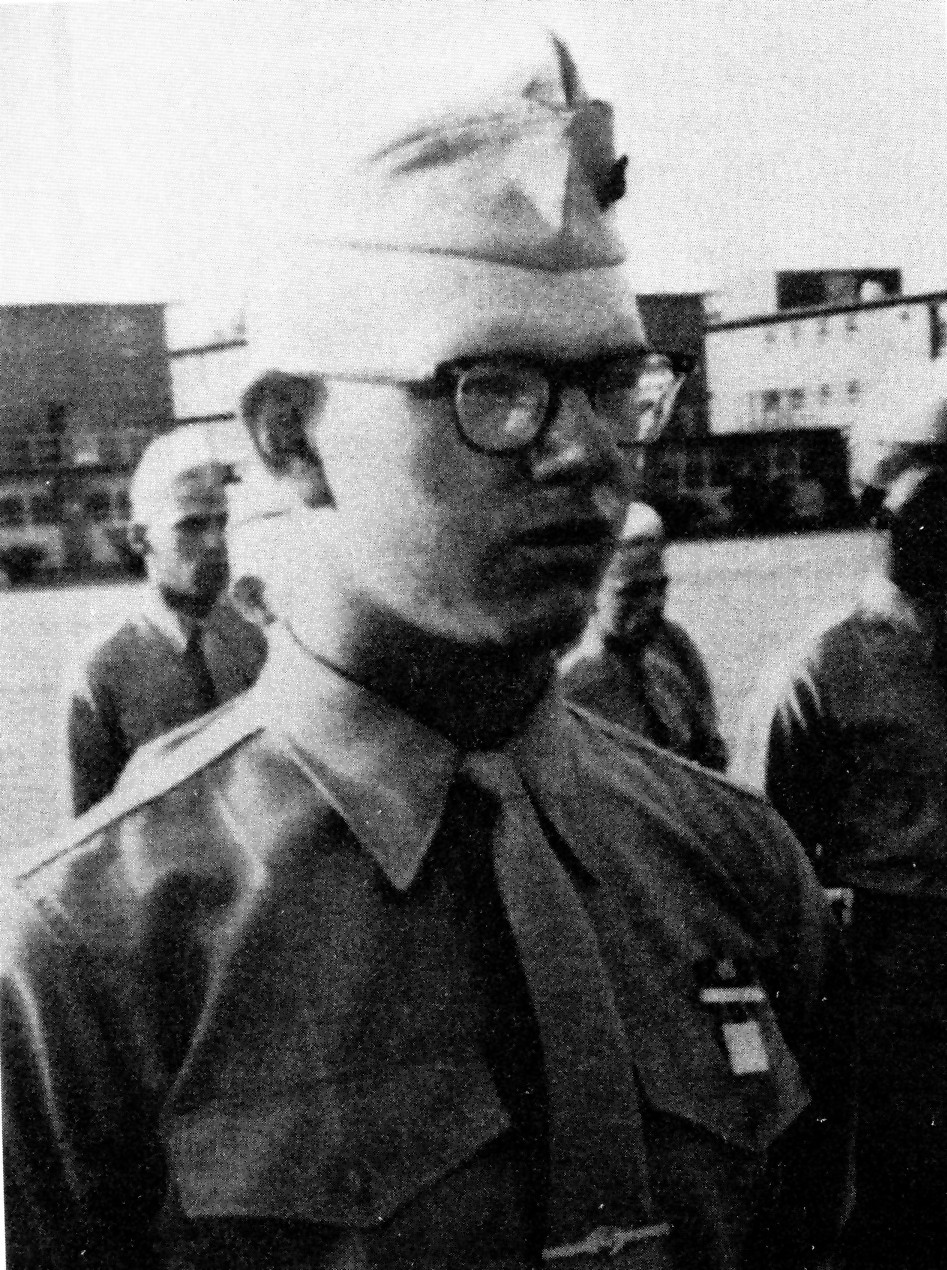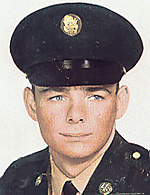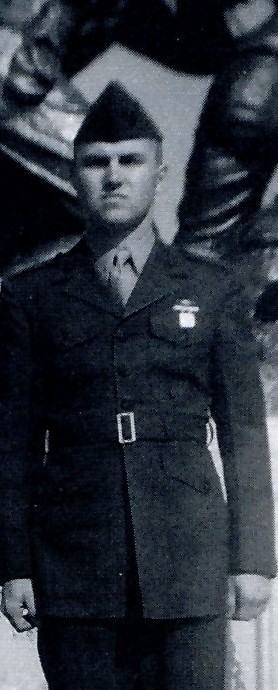
BRUCE D SHARP - PFC
- HOMETOWN:
- pitman
- COUNTY:
- Gloucester
- DATE OF BIRTH:
- March 05, 1948
- DATE OF CASUALTY:
- January 31, 1968
- BRANCH OF SERVICE:
- Marines
- RANK:
- PFC
- STATUS:
- KIA
- COUNTRY:
- South Vietnam
Biography
Bruce D. Sharp was born on March 5, 1948. His home of record is Pitman, NJ.
He served in the US Marine Corps and attained the rank of Private First Class (PFC).
Sharp was killed in action on January 31, 1968.
Bruce
March 5, 1948-January 31, 1968
PFC, Marines Pitman, NJ
(Author's note: The following is excerpted from a work in progress by John Sharp. John is vice-principal of the Kent Island High School in Maryland. He is a devout family man and well respected in the community. It is with my encouragement and gratitude that he shares the life of his older brother, Bruce Sharp, from Pitman, NJ.)
CITATION: For heroic achievement in the connection with operations against the enemy while serving as a Fire Team Leader with Company C, First Battalion, Seventh Marines, First Marine Division (Reinforced), in the Republic of Vietnam on 31 January 1968. While on patrol. Private Sharp's unit was taken under devastating small-arms and automatic weapons fire from a numerically superior enemy force. During the initial burst of enemy fire, the two point men were wounded and pinned down. Quickly assessing the situation, he deployed his men to bring effective suppressive fire upon the enemy positions. Observing the two wounded men lying in an area dangerously exposed to the enemy fire, he unhesitatingly ran to their side and began delivering a heavy volume of accurate fire upon the enemy. Then, fearlessly placing his body between the hostile emplacements and the casualties, he began to administer first aid to his wounded comrades and continued his determined efforts until he was mortally wounded by enemy automatic weapons fire.
Bruce died trying to save two men. The circumstances of his death were comforting and helped to give purpose to a terrible situation. However, in reflection, his actions on that day should not have surprised us. In fact, those actions were just a manifestation of who he was. Bruce had no thoughts of being heroic or doing something to earn a medal. Instead, he was doing what he could to help out those in need, regardless of the danger.
As I look back over the years, I have come to realize that Bruce was just like thousands of others in the same situation. As a nineteen-year old, he went to Vietnam with strong ideals and a vision of what the world should be like. The tragedy of the combat environment tempered this vision and replaced the ideals with the daily struggle to survive. Although duty to the corps and country were still there, they had been pushed to the background and replaced by loyalty to those who were fighting with him.
Consequently, in the minutes when that firefight erupted, Bruce had no thoughts of any loftier ideals. He saw some buddies in trouble and went in to help. I have to think that most would have done the same for him.
The point being that the circumstances of his death should not be his legacy. Bruce had a far greater gift. He had the ability to communicate in a way that would put the reader in his shoes. He had a way of making the experience come alive. Of course, as family, we had long known of this. However, his letters from Nam brought us into the war as no television or newspaper could. Because of those letters, we lived the experience with him.
Most who knew him were not aware of his abilities. As a matter of fact, in high school, he had the nickname of 'Animal' and a reputation of being a tough guy. Those closest to him, however, were aware of some of his other talents.
Alan Hamilton, one of his closest friends, remembered Bruce as a closet intellectual. "He was sensitive and intelligent," Alan said. ""But masked that with the facade of being a tough guy."
Jack Cuddy, another friend and now a Marine Colonel, remembered Bruce's artistic ability and how he could draw characters just like they came off the pages of Mad Magazine. As Jack stated, "Looking back on it now, those cartoons showed not only artistic ability, but also a keen wit and true appreciation of satire."
The intellectual and artistic side really surfaced at home. Bruce had a passion for fine art, classical music, and great works of literature. He sought out intellectual stimulation and was very serious about becoming a writer or an artist. As family, we were aware of his dreams and abilities, but it would take the Vietnam experience for us to understand what a gift he had.
Bruce was a prolific writer. From basic training on Parris Island, through more training at Camp Pendleton, and finally in Vietnam, he wrote what seemed to be volumes describing all aspects of his experiences. Usually, the letters were addressed to Mom, Dad, and myself.
Sometimes, the letters were sent to Mom and Dad, and several he sent to me. More often than not, he was talking to all three of us. However, Dad was a former Marine and a veteran of WWII. Consequently, there were specific incidents, in times of great crisis, that Bruce would talk directly to Dad because he knew he was the only one in the family who could understand what he was going through. From the moment he left, we were in it with him.
Bruce left for VietNam in October of 1967. From the plane, dated October 13, he wrote:
BeencrossingthePacificforwhatseemstobeanendlessperiodoftime-racing thedawn. Later, in the same postcard, he referenced things for Dad. "Wejustflew overIwoJima-itlookslikealargelambchop;MtSarabachiandmemoriesofanother war.EarlierwepassedtinyWake-Justadimflickerofsomewatchfullights."
We didn't hear from Bruce again until October 19, after he had been in Vietnam for a few days. He had been sent to Da Nang and assigned to Hill 10, a few miles to the west.
Ihaven'ttimetowritealengthydescriptionofallIhaveseenandexperienced overthepastfewdays-sufficeittosayIhaveagedataboutthesamespeedasabottle ofthecheapwhiskeythenativesselltousandthatinamillionyears,Icouldn'tdescribe myimpressionofthiscountry.
Although we didn't know it at first, Bruce was settling into the grueling routine of daily patrols and ambushes. As he would state in a later letter:
Ihavethepleasureof beingcordiallyinvitedintothe field about365times(ayear).Usually2patrolsper24 hours.
He was still new to the country and getting used to the environment. This is clearly illustrated in a letter dated November 1, where he described something that happened while out on patrol.
Anothercheerfulincidentoccurredwhenthesquad decidedtospendarainymoonlessnightinaVietnamesevillanearourpatrolbase.The villaconsistedofcongestedlittlecollectionsofwickerbaskets,woodenfences,smellyold earthenpotsasbigasIwasandwaterbuffaloshedsaroundatiny2roomhutmadeof mudwithathatchroof.AsIsaid,itwasraininglikeallgetoutandasweapproached,a toothlessoldmanofbeautifuluglinessemergedfromtheinkydarktogreetusinsoft, toothless,Vietnamesechatter. Tomakealongstoryshort,wesackedoutunderhistiny shedandImusthavebeenespeciallytiredbecauseInosoonerhitthedeckthanIwas out.Well,about3inthemorning,thiscoldbonyhandcreptovermyneckandpecked meonthecheekafewtimes.ItwasstillrainingandIopenedmyeyesjustasaboltof lightninglitupthesky,silhouettingthishorriblelittleman.Idon'tknow,itscaredthe daylightsoutofmebecausehewassougly-hiseyeswerewateryanddeadlooking,his teethwerealloutandhisgumswereblackfromchewingandpussyfrominfectionand hiswholefacewaswrinkledhorribly.Itreallyscaredme.IguessIwasdreamingof homeandforgotIwasinadismalrainforestunderaneerieVietnamesethatchedroof. ...IsquirmedtogetmyknifelooseandthenIsmartenedupand cameto.Heonlywantedtotellmeitwasmyturnontheradiowatch.Boy!I'd'vekilled himthere forasecondthough.
Later, in the same letter, he commented on the homesickness he must have been feeling.
IneverrealizedhowmuchImissthesmellof burningautumnleaves,P.H.S.footballgames-thesememorieskeepcrashingbacklikea subwayracingthroughatunnel-Ican'tblockthemout,nomatterhowmuchI concentrateonthisbusinessofkilling.
Bruce was getting settled in. It wasn't long before he was a veteran and knew the ropes of survival. In fact, he even joked about it as he talked to Dad in a letter dated November 2.
Halloweenwasspentinthemiddleofaswamponpatrol.I'lltellyou Dad,IspendanawfullotoftimethinkingofyouwhenI'moutonthosethings.Ikeep thinkingyou'remySgt.-needlesstosay,you'd findsomemessesthiscrazysquadgetinto interesting. Theeveningjustisn'tcompleteifwedon'tgetlost. Profanitythenechoes fromthefrontandrearandallabout,westruggleaboutuntilwerelocatetheazimuthand canreturn.
About a week later, Bruce described a firefight that his squad was involved in. Although there were a lot of things that he didn't like, in this letter, he showed his pride and confidence in the corps.
Itspeakshighly forusthat2squadsofmarines,actuallyonly 1 squadoutsidethewire, couldbeatawholeplatoonof Congback.The Cong justdon'thavewhatittakestotanglewithmarinesinapitchedbattle.Ofcourse, nooneonearthhas, so it's no great shame.
Bruce had always enjoyed reading. In fact, he wasn't in Nam for very long before he started to talk about getting a subscription to Atlantic Monthly or Time to "keep informed on the Western World somehow." He even asked us to send him an unabridged copy of W. Somerset Maughn's, "Of Human Bondage", and Shakespeare's, "Hamlet" for Christmas.
But in a November letter, and another one that came directly after, he told us he was reading the New Testament.
IneverknewtheNewTestamentwasso fascinating.IwishI'dlivedatthetimeofChrist.Hemust'vereallythrownawrench intotheRomanmachine. Later he commented, "TheNewTestamentistremendous. JesusdefinitelyshouldhavebeenaNobelPrizewinner."
It wasn't long before the climate started to have an impact, especially the rain.
I'mgettingholesinmyfeet whichappeartogrowlargerandmoreinfectiouseachtime Iremovemysocks.Everyonehasthem"junglesoresorjungleulcers". I'llalso probablycontract"junglerot"whichisathletefoot'sbigbrother.
On November 10, he wrote: It'srainingoutsideasusual(it'sbeenrainingatleast10minuteintervalsforthe last3weeks). I'msittinginacornernursingmyjunglesoresandscribblingoutthis, whilelisteningtothestaticthatissupposedtobemusicfromSaigonontheradio.It woulddefinitelybeanimprovementifwedidn'thavearadio.Inthisclimate,ifanything rubsagainstyourbody,itcreatesasmallredareawhichquicklygetsinflamedand infected.Ifyouarecarryingagrenadeinyourpocketanditrubsyourthigh,you'llhave aninfection.Theblousinggartershavethesameeffectonmyanklesandsodoesthe heavycartridgebeltrubbingaroundmywaist.
In mid-November, he was assigned to guard duty on a tower overlooking a river away from Hill 10. At first, he was relieved to be away from the drudgery of the daily patrols. In fact, in his first letter from the bridge, he wrote:
Asyoucanseebythe crookedunsteadylines,I'mwritingthisfromanottoostableposition,namelyatiltedcot atopa65'towerwhichisswayingrythematicallybackandforthinharmonywitha whistlingmonsoonwind.I'mguardingabridgenottoounliketheonein"TheBridgeon theRiverKwai."
He was soon to learn that this assignment could be as dangerous as any other. He would be involved in several firefights. In a letter sent to me, he described one.
Acoupleofnightsago(lastThursdayorFriday),theConghitthisplace.Itwas onlyasquador2,butfromwhereIwas,theactionwassomewhatakintoDavy Crockett'slastmomentsattheAlamo.NotonlywasImanninga65'towerwhichwas entirelyvisibleundertheflowofafullmoon-Iwasontopofthethingatthetimewhere there'snomorecoverthanthataffordedbya foothighrowofsandbags.Bulletsall overtheplace. Itwasallverymelodramatic. Somuchforthat! SufficeittosayI suddenlydiscoveredI'mphysicallyincapableofanycourageinexcessoftheamount requiredtosurvive.
However, the assignment was only temporary. On November 20, he was sent back to Hill 10 and his old outfit. By December, he was back into the routine of daily patrols. In a letter dated December 11, he talked of going out in the monsoon. In this incident, part of their mission was to deliver propaganda sheets to the villagers.
Eachdaywe'reinstructedto tramp,slip,andsplashacross5-9000metersofclaypaddy-dikeswhichseemtomelt eachtimeitrains.Youhaven'tliveduntilyou'vetrampedthrough9000metersofmud whichaverages2andoccasionallyreaches3feetindepth.Thiswhilewearingroughly 100lbs.ofgear.You'rewetfromrain,wetfromsweatundernormalcircumstances, and theinstanttheConghit,wetfromsomethingelse.
In January, the patrols intensified. In a letter to me, dated January 9, Bruce described what an ambush was like.
Thisplacegetsviciouswhenthesungoesdown. Everysquadusuallygoesoutonambush.Generallythey'll setupanLshapedjob-the onewewereinlastnightwaslikethat.Itwasexceedinglymiserableoutthough:forthe entirenightitdidnothingbutrainsoallwecoulddoissitthereinsilenceandshiver-you'dbesurprisedhowfreezingcolditcangetoutatabout3inthemorning.Actually, thetemp'sprobablyonly60,butwhenyouspendallofyourdaylighthoursintemps averaging85or90,itcreatesa30degreedropeachnight.Result:youfeellikeyouare goingtofreezetodeath.Haveyoueverjustsatinoneplaceuntilyourlegscrampup andthemosquitoes,you'reconvinced,havechewedalloftheskinoffyourface. Add tothatthesweatyfearthatcomesfromuncertaintyabout exactlyhowmuchlongeryouhavetolive-whetheryou'll evenlastthenightorwon't instead,be foundlyingintheweedswithyourthroatslashedopenandyouhavearough ideaofwhatitislike.Undernormalconditionsthemoonnevercomesoutandonthe rareoccasionsitdoes,isobscuredcompletelybythickcloudssotheVietnamesenight cangetincrediblydark.Usually,you'reunder foliagesothickyou'dneverseetheskyif youlookedupanyway.Nothingbutleavesandbugsandnoisesandshapesyoustrain youreyesandearsoutforhourstoidentify,butnevercan.It'sanightmareatnight.
Throughout the month of January, 1968, Bruce talked of the increased activity in his area. The Cong started to attack Da Nang with rockets. As Bruce said in a letter dated January 20:
Twonightsago,thecompanyreceivedit's firsttasteof'modern warfare',theonlydifferencebeingthattheprimitiveundertonesoffearwhichalways augmenttheconventionalstrugglesweresuddenlyamplifiedathousandtimesbythe suddenappearanceoverthedismalswampsofthenewhorror-rockets.Somehow,theVC managedtohaulSoviet-made122-mmrocketsacrossthebackcreeks.
Bruce was killed on January 31. By the time of his death, he had endured most everything the hostile environment could present. There is no doubt that it changed him. But I have to believe that thousands of other U.S. soldiers had similar experiences. Surely, they were unique in their own way, but most everyone had to deal with such things as homesickness, the monsoon, the grueling routine, anxiety and excitement of a firefight, the fear of death, and a thousand other situations. Thanks to Bruce, we know a little about what it was like.
I have only been to the Wall once. The experience was overpowering and I can honestly say that I was not prepared. As I approached the panel where Bruce's name is inscribed, I was overwhelmed by the atmosphere. I had expected to look at Bruce's name, reminisce and be proud of his service. Instead, my mind did not focus. I was consumed by fear, guilt, pain and especially, anger. I walked away, stunned by the very emotions he had expressed to us time and again in his letters. I cannot explain how that black piece of granite could evoke such a feeling, but it cut right to my soul. I was being carried back to 1967 and it was not a pleasant experience.
I was sixteen and ready to take on the world. Bruce was nineteen and did. Within a span of eleven short months, we would both get a taste of reality. It was bitter for me; fatal for him. When he died, I was sad, then angry, but I eventually accepted it and got on with my life. Why then, was I experiencing such strong emotions now? It didn't make any sense.
It took some time and a lot of reflection, but the answer finally came to me. The name on the Wall and all those letters clearly reminded me of my brother and that time. But the pain I felt was not for Bruce. It was for us. My memories also included what happened at home. I remember the impact on Mom and Dad each time one of those letters would arrive. I remember their fears and anxiety as they watched him go off to war. I remember the frustration as they desperately wanted to help him when he called out from that hostile environment. I remember the pain when their worst fears came true with the news of his death. I remember their pride as they angrily defended his commitment and sacrifice against a swelling tide of discontent with the war. I remember my own feelings as I stumbled from adolescence to adulthood, trying to comprehend not only the changes that were happening to me, but also the impact of the war on Bruce, Mom and Dad. But more than anything, I remember the emptiness.
Bruce fought to survive in Vietnam. Mom and Dad battled to bring him home. Every ounce of energy was committed to seeing him through. The struggle raged for months and each day, it seemed to intensify. It was total, it was exhausting, and there would be no surrender or retreat. But then, all of a sudden, it was over. Bruce was gone. He was never coming home. All of the ceremonies, all of the pride, and all of the memories could not erase that sense of failure. We had never been apart and had never failed each other. That rush of emotion was as much about us as it was about Bruce.
Bruce David Sharp was awarded the Bronze Star for valor. He was buried on February 15, 1968 in Eglington Cemetery in Clarksboro, NJ. I looked up to him, I learned from him and I loved him. I have dedicated my life to the ideals that I inherited from both my parents and Bruce.
Excerpt from They Were Ours: Gloucester County's Loss in Vietnam
by John Campbell
Used with permission of author
Sources: John Campbell and NJVVMF.
Remembrances
Be the first to add a remembrance for BRUCE D SHARP
Help preserve the legacy of this hero, learn about The Education Center.
LEARN MORE

